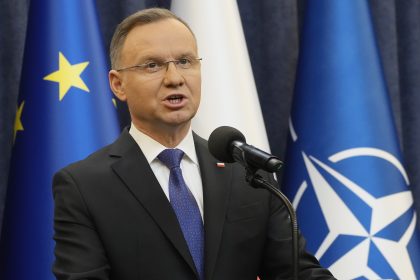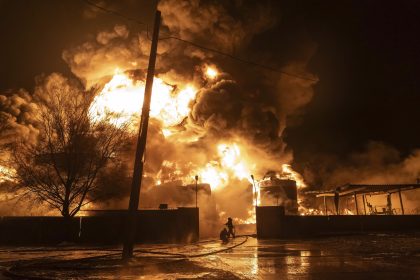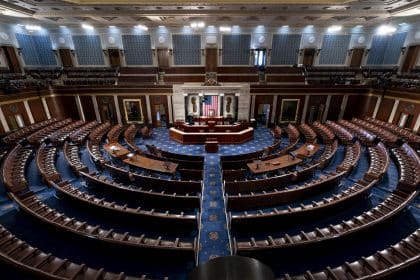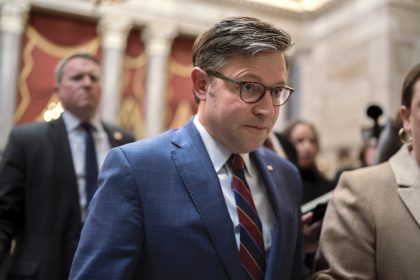Ruble Plummets as Sanctions Bite, Sending Russians to Banks
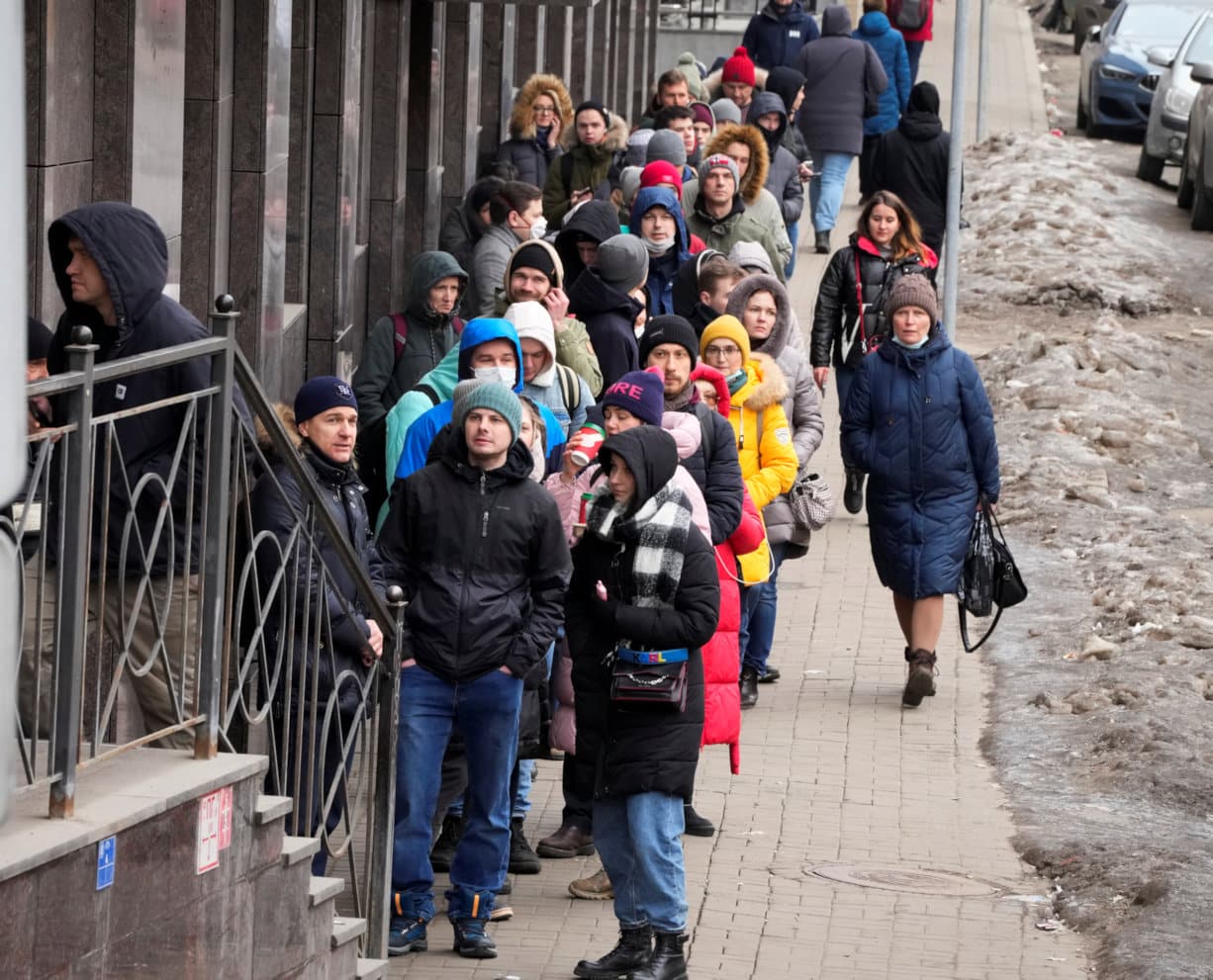
MOSCOW (AP) — Ordinary Russians faced the prospect of higher prices and crimped foreign travel as Western sanctions over the invasion of Ukraine sent the ruble plummeting, leading uneasy people to line up at banks and ATMs on Monday in a country that has seen more than one currency disaster in the post-Soviet era.
The Russian currency plunged about 30% against the U.S. dollar after Western nations announced moves to block some Russian banks from the SWIFT international payment system and to restrict Russia’s use of its massive foreign currency reserves. The exchange rate later recovered ground after swift action by Russia’s central bank.
But the economic squeeze got tighter when the U.S. announced more sanctions later Monday to immobilize any assets of the Russian central bank in the United States or held by Americans. The Biden administration estimated that the move could impact “hundreds of billions of dollars” of Russian funding.
Biden administration officials said Germany, France, the UK, Italy, Japan, European Union and others will join the U.S. in targeting the Russian central bank.
Tyler Kustra, an assistant professor of politics and international relations at the University of Nottingham, said he couldn’t recall a similar example from the past of an economy brought to its knees by global sanctions.
“This is the West causing a currency crisis for Russia,” said Kustra, who studies economic sanctions.
Russians wary that sanctions would deal a crippling blow to the economy have been flocking to banks and ATMs for days, with reports in social media of long lines and machines running out. People in some central European countries also rushed to pull money from subsidiaries of Russia’s state-owned Sberbank after it was hit with international sanctions.
Moscow’s department of public transport warned city residents over the weekend that they might experience problems with using Apple Pay, Google Pay and Samsung Pay to pay fares because VTB, one of the Russian banks facing sanctions, handles card payments in Moscow’s metro, buses and trams.
A sharp devaluation of the ruble would mean a drop in the standard of living for the average Russian, economists and analysts said. Russians are still reliant on a multitude of imported goods and the prices for those items are likely to skyrocket, such as iPhones and PlayStations. Foreign travel would become more expensive as their rubles buy less currency abroad. And the deeper economic turmoil will come in the coming weeks if price shocks and supply-chain issues cause Russian factories to shut down due to lower demand.
“It’s going to ripple through their economy really fast,” said David Feldman, a professor of economics at William & Mary in Virginia. “Anything that is imported is going to see the local cost in currency surge. The only way to stop it will be heavy subsidization.”
Russia has moved to produce many goods domestically, including most of its food, to shield the economy from sanctions, Kustra said. He expected that some fruits, for example, that can’t be grown in Russia “are going to be suddenly much more expensive.”
Electronics will be a pain point, with computers and cellphones needing to be imported and the cost going up, Kustra said. Even foreign services like Netflix might cost more, though such a company could lower its prices so Russians could still afford it.
The Russian government will have to step in to support declining industries, banks and economic sectors, but without access to hard currencies like the U.S. dollar and euro, they may have to resort to printing more rubles. It’s a move that could quickly spiral into hyperinflation.
The ruble slide recalled previous crises. The currency lost much of its value in the early 1990s after the end of the Soviet Union, with inflation and loss of value leading the government to lop three zeros off ruble notes in 1997. Then came a further drop after a 1998 financial crisis in which many depositors lost savings and yet another plunge in 2014 due to falling oil prices and sanctions imposed after Russia seized Ukraine’s Crimea peninsula.
Russia’s central bank immediately moved to try to halt the slide of the ruble. It sharply raised its key interest rate in a desperate attempt to shore up the currency and prevent a run on banks. It also said the Moscow stock exchange would remain closed Monday.
The bank hiked the benchmark rate to 20% from 9.5%. That followed a Western decision Sunday to freeze Russia’s hard currency reserves, an unprecedented move that could have devastating consequences for the country’s financial stability.
It was unclear exactly what share of Russia’s estimated $640 billion hard currency pile, some of which is held outside Russia, would be paralyzed. European officials said at least half of it will be affected.
That dramatically raised pressure on the ruble by undermining financial authorities’ ability to support it by using reserves to purchase rubles.
Kremlin spokesman Dmitry Peskov described the sanctions that included a freeze on Russia’s hard currency reserves as “heavy,” but argued Monday that “Russia has the necessary potential to compensate the damage.”
The steps taken to support the ruble are themselves painful because raising interest rates can hold back growth by making it more expensive for companies to get credit. Russians who have borrowed money, such as homeowners with mortgages or business owners who have taken out loans, could also get hit by the central bank’s decision to double interest rates, Kuskra said.
The central bank ordered other measures to help banks cope with the crisis by infusing more cash into the financial system and easing restrictions for banking operations. At the same time, it temporarily barred non-residents from selling the government obligations to help ease the pressure on the ruble from panicky foreign investors trying to cash out of such investments.
The ruble sank about 30% against the U.S. dollar early Monday but steadied after the central bank’s move. Earlier, it traded at a record low of 105.27 per dollar, down from about 84 per dollar late Friday, before recovering to 94.43.
Sanctions announced last week had taken the Russian currency to its lowest level against the dollar in history.
___
Sweet contributed from New York, and McHugh from Frankfurt, Germany. AP reporters Kelvin Chan in London and Daria Litvinova in Moscow contributed.


















